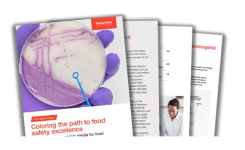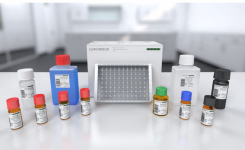FDA Clearance for EK/P. aeruginosa PNA FISH® Identification from Blood Cultures
go back to news archivesAdvanDx has received FDA 510(k) clearance for EK/P. aeruginosa PNA FISH® to identify Escherichia coli and/or K. pneumoniae as well as Pseudomonas aeruginosa directly from positive blood cultures. EK/P. aeruginosa PNA FISH is the first-ever test capable of identifying E. coli and/or K. pneumoniae and P. aeruginosa directly from positive blood cultures and the latest addition to AdvanDx's easy-to-use, molecular-based PNA FISH diagnostics platform. PNA FISH tests now provide rapid, therapy-guiding results for 95-99% of patients with bloodstream infections and positive blood cultures. Every year, an estimated 100,000 patients develop bloodstream infections (BSI) due to Gram-negative pathogens mainly E. coli, K. pneumoniae and P. aeruginosa. Patients afflicted by these serious infections spend an average of 5-24 days in the hospital, suffer mortality rates as high as 40% and cost institutions on average $40,000 to $60,000 per case (1,2). Studies show that providing a 24 hours 'head start' on appropriate narrow-spectrum therapy for Gram-negative bloodstream infections may improve clinical outcomes, reduce antibiotic resistance rates and reduce the incidences of adverse events (3,4). EK/P. aeruginosa PNA FISH will enable microbiology labs to provide clinicians rapid, accurate Gram-negative pathogen identification results in hours, instead of days. 'We are very excited to launch EK/P. aeruginosa PNA FISH and provide another critical tool to help laboratories and clinicians provide faster results and improve care for patients with these life threatening infections,' said Thais T. Johansen, President and CEO of AdvanDx. 'Our PNA FISH diagnostic platform now provides a complete solution by enabling rapid identification results for 95 to 99% of all patients with bloodstream infections,' Johansen concluded. References: 1 Kang et al. Bloodstream Infections Caused by Antibiotic-Resistant Gram-Negative Bacilli: Risk Factors for Mortality and Impact of Inappropriate Initial Antimicrobial Therapy on Outcome. Antimicrobial Agent and Chemotherapy. 2005 Feb; 49:760-7662Paterson et al. Impact of Antibiotic Resistance in Gram-Negative Bacilli on Empirical and Definitive Antibiotic Therapy. Clinical Infectious Diseases. 2008; 47:S14-20 3Slama et al. Gram-negative antibiotic resistance: there is a price to pay. Critical Care. 2008 May;12 Sup 4:1-9 4Thom et al. Impact of Empiric Antimicrobial Therapy on Outcomes in Patients with Escherichia coli and Klebsiella pneumoniae Bacteremia: A Cohort Study. BMC Infectious Diseases. 2008 Sept; 8(116) |
NOTE: This item is from our 'historic' database and
may contain information which is not up to date.
Source : AdvanDx View archived contact details
Posted on May 7, 2009
















